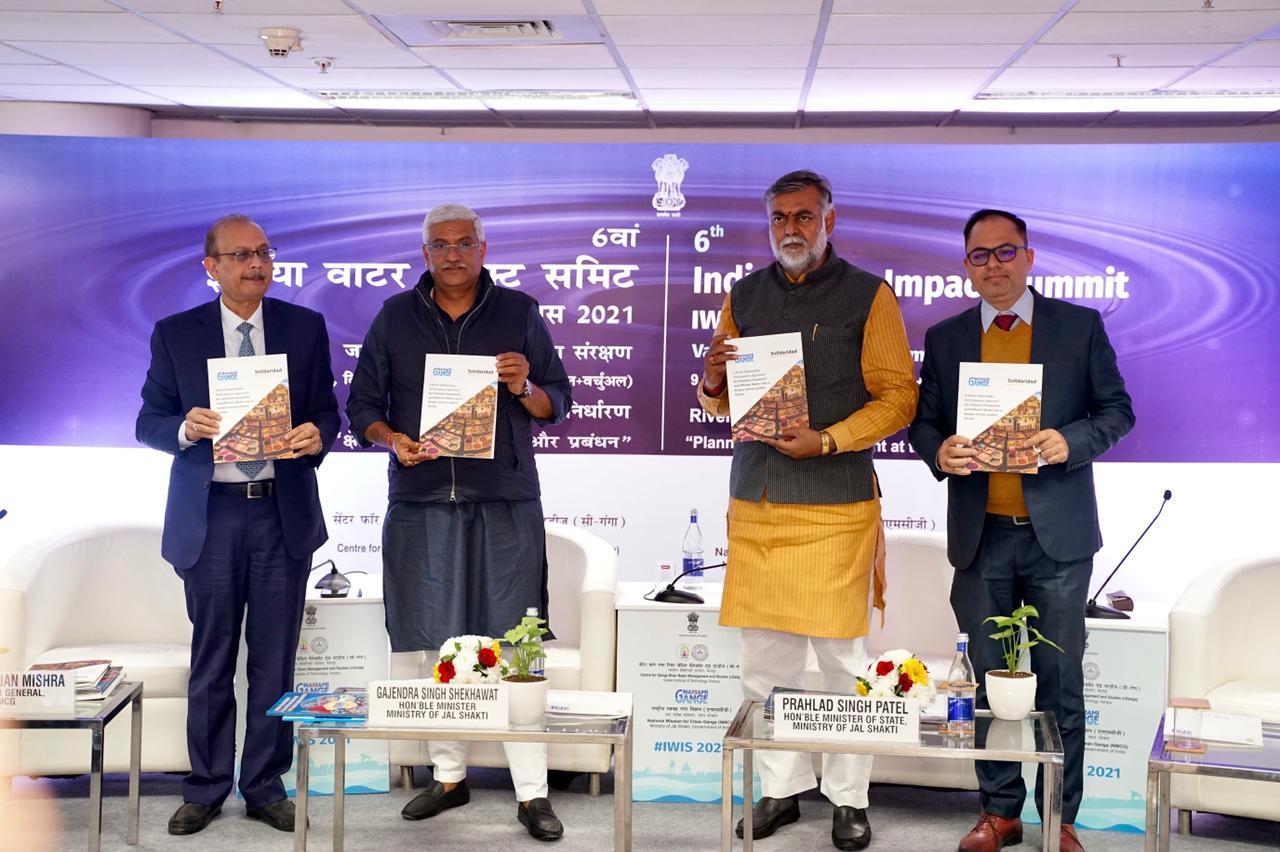Jal Shakti Minister Shekhawat Inaugurates 6th India Water Impact Summit (IWIS)
Gajendra Singh Shekhawat, Union Minister for Jal
Shakti inaugurated the 6th India Water Impact Summit, along with
Prahlad Singh Patel, Minister of State, Ministry of Jal Shakti and Rajiv Ranjan
Mishra, Director General, National Mission for Clean Ganga. Prof Vinod Tare,
Founding Head, Centre for Ganga River Basin Management and Studies (C-Ganga)
and Professor, IIT Kanpur joined the session virtually from Kanpur. The Summit
is being conducted from 9th to 14th December 2021 in a
hybrid mode - online and physically at the NMCG office, New Delhi and IIT,
Kanpur. The theme of the Summit this year is ‘River Resources
Allocation-Planning and Management at the Regional Level’.
During the session, Gajendra Singh Shekhawat, Union
Minister of Jal Shakti appreciated how NMCG has established an exemplary model
for river basin management, which can be replicated and scaled to other river
basins not only in the country but also globally. He added, “The climate change
scenario is forcing us to confront with increasing food and water insecurity.
Summits like these are very important, and they give us the opportunity to
learn from each other. They also encourage us to converge with other Ministries
such as Ministry of Ayush, Culture and Tourism, and other sectors to achieve
the Hon'ble Prime Minister’s vision for India’s development”.
Prahlad Singh Patel, Minister of State, Ministry of
Jal Shakti said “Forests, vegetation, land around rivers are all a part of the
river resources which help in maintaining the balance of the ecosystem and
protecting them is emerging as the biggest challenge in front of us. As
different rivers have different origins, it is important that we recognize that
the solutions to save them must also be based on local contextualized
conditions. Most important is to maintain the continuous flow in rivers as that
itself would help rivers to self-rejuvenate. Developing a regional approach is
vital.” He congratulated NMCG in its efforts to rejuvenate and preserve the
Ganga by sanctioning over 353 projects at a cost of Rs 30,458 crores.
Rajiv Ranjan Mishra, Director General, NMCG stated,
“The Summit carries forward the earlier work of the Ganga River Basin Management
Plan which laid the foundation for the Namami Gange Mission. Concerted efforts
are now being made to go beyond the main stem of the Ganga and roll out
detailed interventions in the tributaries as well. Today’s theme is important
as it will help us to understand river resources and their interdependence in
order to plan their sustainable use. It is imperative that we understand and
value the ecosystem services of rivers which extends beyond water. At the same
time, all stakeholders whether big or small need to be included in the
discourse as well. There is also a need to look at policies, governance,
science, financial innovations which is why the sessions in the Summit have
been planned in a carefully designed manner, coupled with bilateral and multilateral
international sessions.”
He added, “Quest for understanding the rivers is at
the heart of our mission and preserving rivers as living systems is at its
core. This Summit would help in that direction”.
During the session, the report titled ‘A
Multi-Stakeholder Participatory Approach for Pollution Prevention and Efficient
Water Use in Kanpur-Unnao Leather Cluster’ jointly prepared by NMCG and
Solidaridad was launched. The report demonstrates the successful interventions
in the Kanpur-Unnao cluster for preventing pollution and improving water use
efficiency by catering issues at the value chain level. It further sheds light
upon the need for identification of core sectoral issues to address pollution,
waste water management. It also
advocates public-private partnership
approach to enable replication and scalability.
The first day of the Summit also witnessed three
other technical sessions. The first session was on River Goods and Services
vis-à-vis anthropocentric interventions for basin resource planning. The need
to review our understanding of river resources and ecosystem services with
respect to anthropocentric interventions was discussed during the session. The
second session was on Economics and Financing of Sludge which discussed how cities
can potentially cope with the increasing rate of sludge generation and the
conditions under which they can be supported in the finances. The session also
discussed the strategic pilot projects which have been launched by NMCG and
C-Ganga to treat and process sludge as well as the facility which is being set
up to finance the projects with the support from green investors around the
world. The third session which was the international session, focused on ‘India
- Norway collaborations’ in the backdrop of the recently signed MoU for the
development of sludge management framework between C-Ganga and Norwegian
Institute of Bioeconomy Research (NIBIO).
The first day
of IWIS was streamed live on the social media handles of the Namami Gange
viewed by thousands of stakeholders including students, experts from technical
and financial community, civil society, government and non-government
organizations and various other partners. The IWIS would again be streamed live
for the remaining four days as well.


